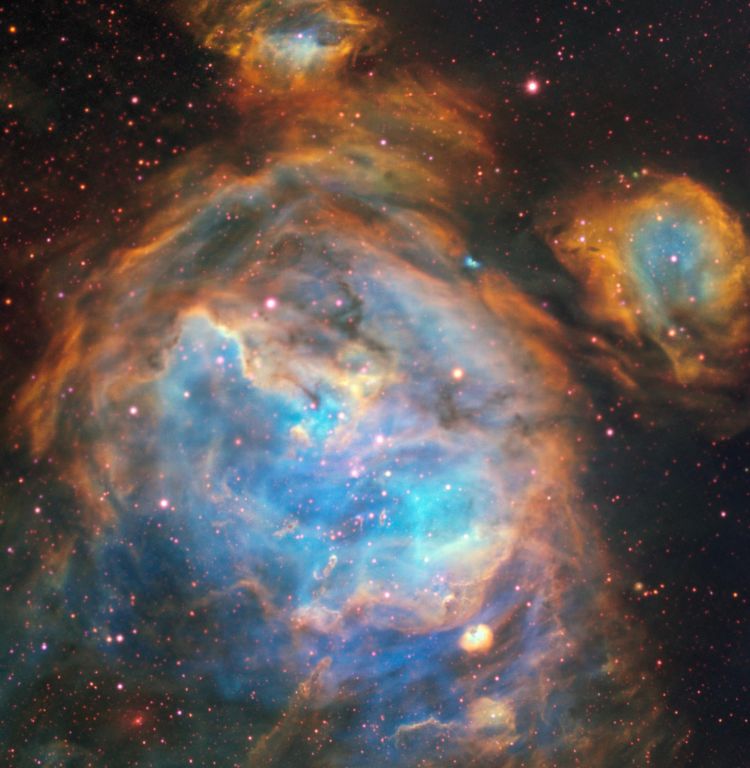The Bolton Lecture in Astronomy

- Date: Wednesday 3 December 2025, 17:30 – 18:30
- Location: Conference Auditorium
- Cost: Free but booking is essential
Join us for the upcoming Bolton Lecture in Astronomy on Wednesday 3 December 2025.
Massive Stars and Where to Find Them
Massive Stars are the giants of the cosmos: rare, brilliant, and short-lived. They burn their fuel millions of times faster than our Sun, sculpt galaxies with their winds and explosions, and forge the elements that make planets and people possible. Yet, according to the simplest laws of physics, they shouldn’t exist at all: the force of their own radiation should blow them apart before they ever form.
In this talk, we’ll follow these cosmic heavyweights through their fast and furious lives, from their hidden birthplaces inside dusty stellar nurseries, to their brief and blazing reigns as the brightest beacons in the night sky, to their spectacular deaths as supernovae or silent collapses into black holes. Along the way, we’ll explore how astronomers track them down across the electromagnetic spectrum and across the Universe, from our own Milky Way to galaxies billions of light-years away.
Join us on a journey to discover massive stars and where to find them.
About our speaker
Born and raised in the Swiss Alps, Dr Anna McLeod obtained a Bachelor of Science (BSc) degree in Physics and Astronomy from Ludwigs-Maximilians-Universität in Munich, an Master of Science (MSc) in Astrophysics from Radboud University Nijmegen, and a magna cum laude Doctor of Philosophy (PhD) in 2016 (again in Munich) from the European Southern Observatory and Ludwigs-Maximilians-Universität.
She went on to be a Marsden Fellow of the Royal Society of New Zealand at the University of Canterbury in Christchurch, followed by a NASA Hubble Fellowship award which she held at the University of California Berkeley, before taking up a faculty position at Durham University in 2020.
Dr McLeod’s research is in the fields of massive star formation, stellar feedback, gravitational wave progenitors, and galaxy evolution. She is also passionate about science engagement, and she is currently leading the construction of an outreach observatory in southern Switzerland where she recently gave a TEDx talk.
Image Credit: ESO, A McLeod et al. available at https://www.eso.org/public/images/eso1903a/
Venue Details
Parking for visitors
Parking is available to the public in the Orange Zone on weekday evenings (5pm – 7am), which includes the Edge (w3w.co/option.exams.member) and Multistorey (w3w.co/market.tree.fees) car parks. Automatic number plate recognition (ANPR) is in operation in this car park.
Please do not pay on arrival. Payment for parking is required as per the tariff displayed within the car parks and should be made before exit at any of the cashless pay machines. These tariffs also apply to Blue Badge holders.
Find out more information at https://estates.leeds.ac.uk/our-services/car-parking/visitor-parking/#public-info
We'll provide free minibus parking for schools, please email physics.outreach@leeds.ac.uk with the registration plate for spot to be booked for you.
Accessibility
The Conference Auditorium is fitted with an Infrared (IR) Transmitter assistive listening system. To use this facility, an IR receiver is needed. If you have a receiver, you can sit anywhere in the room where you have a clear view of the presenter.
The venue has step-free access and accessible toilets, with seven Blue Badge parking bays less than 200 metres away from the entrance in the Edge car park off Willow Terrace Road. For more detailed information about building accessibility, please visit the entry on AccessAble.
Each year we learn more about how we can make our events more accessible. If you have any ways we can ensure that you have a more accessible visit, please email physics.outreach@leeds.ac.uk.
Book your place
The lecture will take place in the Conference Auditorium at the University of Leeds and will commence at 5:30pm.
Booking is required to attend this event – you can do so at our dedicated ticket portal.
If you have any questions, please get in touch with physics.outreach@leeds.ac.uk.

